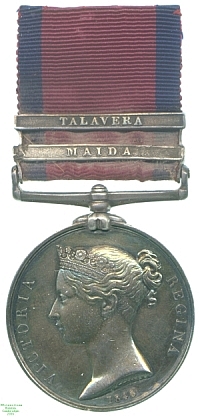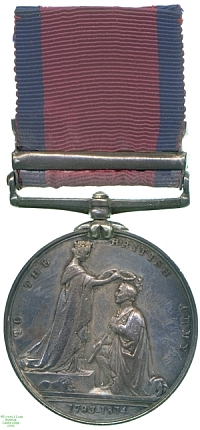
Obverse, a bust of Queen Victoria facing left

Reverse, Queen Victoria on dais placing a wreath on the head of the kneeling Duke of Wellington

Obverse, a bust of Queen Victoria facing left |

Reverse, Queen Victoria on dais placing a wreath on the head of the kneeling Duke of Wellington |
It had been unusual, before the reign of Queen Victoria, for medals to be issued recognising service in campaigns (except perhaps those organised by the East India Company). This left, for example, veterans of the Napoleonic Wars with nothing to display for their service, and therefore three medals were instituted in 1847-1848 for campaigns of the previous fifty years, in the East India Company's forces, in the Royal Navy or in the Army, the last of which was the Military General Service Medal, instituted in 1847 and first struck in 1848.
The intentions of the medal committee are hard to divine, as the medal was struck carrying the dates `1793-1814' in the reverse, but the earliest campaign considered was that in Egypt from 1798 to 1801. Earlier battles may have been deleted from consideration due to the shortage of surviving veterans of engagements of the previous century. This was one of the paradoxes shared by all three of the General Service Medals, another being that the monarch whose portrait they bore, Queen Victoria, was not him for whom the recipients had fought.
Although most of the campaigns for which the MGSM was awarded were fought in the Peninsular War, leading to the piece being frequently known as the Peninsular Medal, it was also awarded for conflicts far further afield. In some cases, like this one, it was awarded for participation in both.
The bar for Maida records a British victory over the French forces of General Reynier at Maida in Calabria, Italy, 1806, where British forces had been sent in support of Austria's 1805 campaign that resulted from Emperor Napoleon Bonaparte having declared himself Emperor of Italy. Major-General Sir John Stuart was able to position his forces to fire broadside into the flanks of the French column, which was decimated. Maida Vale in London is named after this battle.
Talavera, by contrast, was a costly British and Spanish victory in 1809 in the Peninsular War, in which General Sir Arthur Wellesley, the later Duke of Wellington (whose portrait is on the MGSM's reverse), defeated the French forces of Maréchal Soult; it was also however the occasion which fractured the fragile cooperation between British and Spanish forces. Wellesley would attempt to fight without Spanish support thereafter until given full command in 1812, although the Spanish guerilla effort was nonetheless instrumental in the eventual Allied victory in the theatre.
This medal was awarded to Private Thomas Boland of the 61st Foot, who it would seem managed to survive both these battles. Lester Watson purchased his medal at some point before 1928.